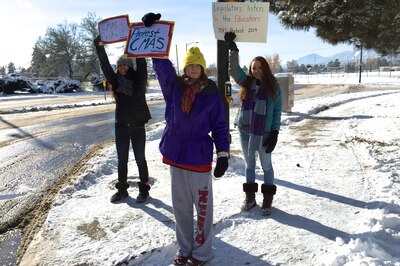For more than two decades, Colorado public school students have taken annual tests to measure how well they’ve mastered the state’s English and math learning standards.
The spring tests have evolved since 1997, when they were first given to fourth graders. These days, they’re measuring whether students met updated standards that emphasize critical thinking and are usually taken on a computer or tablet, not with paper and pencil.
Now the state’s tests are about to change again — for the third time in seven years.
Last month, the state education department announced it would back away from the multi-state testing partnership known as PARCC to begin developing its own English and math tests with help from the international testing conglomerate Pearson. The British-based company already helps the state design and administer its social studies and science tests. Pearson also provides the technology used to give the PARCC test.
State officials said the multi-year transition should cause little disruption. Beginning next spring, Colorado students are expected to take an abbreviated PARCC test. Then in 2019, the state will use a sampling of questions purchased from PARCC and new questions it develops with Pearson’s help.
One of the goals of the protracted transition is to maintain year-to-year comparability between tests. Colorado uses the results of the tests to measure school quality, and in some cases teacher ratings. If the tests were to be completely overhauled as they were in 2015, the state would lose a year of data, forcing a pause on school ratings.
How did we get here? Here’s a timeline of the past, present and (anticipated) future of Colorado’s standardized tests.
1993
Colorado lawmakers require the state education department to develop academic standards and tests to measure how well students know those standards. The tests were known as the Colorado Student Assessment Program, or CSAP.
1997
The CSAP is given for the first time to fourth grade students. Additional grades were added in later years.
2001
President George W. Bush signs the No Child Left Behind Act into law. The landmark legislation requires states to test every student in grades three through eight and once in high school in the subjects of math and English. Testing in Colorado is expanded to meet federal requirements, which also included math tests for third and fourth graders, and science tests for fifth and 10th grade students.

Colorado high school juniors are required to take the ACT, a college entrance exam. Previously, the test was voluntary.
2008
Colorado lawmakers order an update to the state’s academic standards and new tests to measure how well students are learning.
2010
Colorado adopts new academic standards, including the Common Core State Standards. The national standards, created by association groups of governors and education commissioners, put a greater emphasis on critical thinking in both math and English.
2012
Colorado students begin taking a new English and math test, the Transitional Colorado Assessment Program, or TCAP. The test was meant to bridge the gap between the state’s previous academic standards and the new ones.
Colorado becomes a governing member of PARCC, the Partnership for Assessment of Readiness for College and Careers. Begun with seed money from the federal government, PARCC is one of two multi-state efforts that built new tests to measure how well students are learning the Common Core standards.
2014

Colorado launches its new science and social studies tests on computers. The tests are given to students in one grade each in elementary, middle and high schools. The online tests were a break from the pencil and paper tests of the past.
Some high school seniors refuse to take the tests, making Colorado one of the national centers of the testing opt-out movement.
2015
Before Colorado gives its first PARCC tests, state lawmakers go to work reducing the number of tests public school students take. Lawmakers reach a last-minute compromise that scales back testing in high school.
Colorado becomes one of a dozen states to give the inaugural PARCC tests. School districts in mostly suburban and rural areas report a large number of students opting out of the tests.
As a result of the legislative testing compromise, the Colorado Department of Education announces a shift from the ACT to the SAT college prep exam for high school juniors, and to the PSAT for sophomores.
2016
Colorado high school sophomores take the PSAT test for the first time, while high school juniors take the ACT for the last time.
The State Board of Education directs the state education department to take bids for a new math and English test for grades three through eight. The board outlines three goals: make the tests shorter, get results back quicker and give Colorado exclusive authority over the design of the tests.
2017
Colorado lawmakers continue to tweak the state’s testing system: They scrap the PARCC test for ninth graders, in favor of a test aligned to the SAT.
Colorado juniors take the SAT for the first time.
The state education department announces that the textbook and testing company Pearson won a competitive bid to help the state develop and administer its own English and math tests. The company also will continue to administer the state’s social studies and science tests.
The department begins working with teachers to develop new questions for English and math tests.
2018
Colorado will begin its transition away from PARCC, working with the organization to limit the length of the final round of tests to meet the expectations of the state board. The state is also working with PARCC to have student results returned sooner. However, the 2018 math and English tests will be largely unchanged.
The state will complete it review of its academic standards, informing any additional changes to the state’s tests.
2019
Colorado, working with Pearson, will take sole control over the design of the state’s English and math tests. The state plans to purchase some questions from the PARCC organization, as well as develop new test questions with Pearson. Colorado officials said they plan to only purchase questions from PARCC that were developed with Colorado teachers.
Update: This post was updated to clarify that Pearson provides the technology to administer the PARCC tests, which Colorado currently uses.


